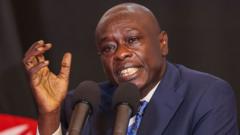This website uses cookies so that we can provide you with the best user experience possible. Cookie information is stored in your browser and performs functions such as recognising you when you return to our website and helping our team to understand which sections of the website you find most interesting and useful.


Kenyan MPs are due to vote on whether to impeach Deputy President Rigathi Gachagua in a political row that has gripped the nation following his recent fallout with President William Ruto.
The lawmakers accuse Gachagua of corruption, practising ethnically divisive politics and undermining the government, among a host of other charges.
The 59-year-old politician, popularly known as “Riggy G”, has described the allegations against him as "outrageous" and "sheer propaganda", maintaining they are part of a plot to hound him out of office.
He is expected to appear before parliament to defend himself before the vote, after which impeachment proceedings will move to the Senate.
Political tensions have been running high in the East African country since June when deadly demonstrations erupted over unpopular tax hikes, exposing a deep rift between Ruto and Gachagua.
Ruto sacked most of his cabinet and brought in members of the main opposition following the anti-tax protests, in which more than 50 people were killed.
Several MPs allied to Gachagua were summoned by police last month, accused of funding the protests - though no charges were brought.
Ahead of the vote, security has been heightened in the capital, Nairobi, with police patrols and major roads leading to parliament blocked to the public.
About 20 lawyers have been hired to defend Gachagua against the impeachment motion, local media reports.
A total of 291 MPs, more than the 117 required by the constitution, signed the motion to initiate the impeachment process last week.
Gachagua has failed in numerous court bids to stop the proceedings going ahead.
In a televised speech on Monday, Gachagua accused Mwengi Mutuse, the MP who drafted the motion, of lying, calling it “shameful and sensational”.
The motion lists 11 grounds for impeachment, including accusations that Gachagua amassed assets worth 5.2bn Kenyan shillings ($40m, £31m) in two years in unexplained wealth.
"I am innocent of all these charges," Gachagua said.
"I have no intention whatsoever to resign from this job. I will fight to the end."
The deputy president said some of the properties listed in the motion belonged to his late brother.
He also defended the controversial renovation for his official residence in the capital.
When big decisions are to be taken by MPs, the constitution stipulates that the public must be consulted first.
According to a parliamentary report, more than 200,000 responses were received as part of that process - of which 65% supported Gachagua's impeachment, while nearly 34% opposed it.
On Sunday, Gachagua appealed to Ruto and the MPs to forgive him for any wrongdoing during his tenure. He later clarified that his apology was not an admission of guilt.
Ruto is yet to comment about the impeachment motion publicly, but he is on record in the early days of his presidency as saying that he would never publicly humiliate his deputy.
For the motion to pass, it requires the support of at least two-thirds of members of the National Assembly, the lower house of parliament.
It is expected to sail through given that the main opposition has now joined forces with the president's party.
Gachagua, a wealthy businessman from the vote-rich Mount Kenya region, battled previous corruption scandals to become Ruto's running mate in a closely fought election in August 2022.
He is from the Kikuyu community, the country’s largest ethnic group, while President Ruto is a Kalenjin, an ethnic group which mainly lives in the Rift Valley.
These two communities were at loggerheads after elections in 2007 - ethnic violence in which 1,200 people died nationwide.
If the Senate backs the motion too, Gachagua would become the first deputy president to be impeached under the constitution adopted in 2010.
In 1989, then Vice-President Josephat Karanja resigned from office when he faced a similar motion.



 Africana55 Radio
Africana55 Radio 
